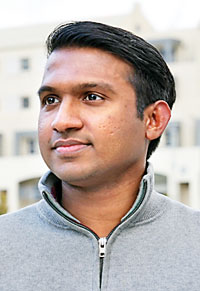Meeting the global business challenge
View(s):
Sanki Brightened
In today’s competitive global economy many university graduates recognise the intrinsic value of a tertiary education that will help them hone their technical abilities and build valuable soft skills that include international business relations and cultural awareness coveted by employers.
A world class postgraduate degree from an internationally respected university, such as Australia’s leading university the University of Melbourne,can enable graduates to stand out from the crowd in their journey towards an international career.
University of Melbourne graduate, Sankitha Samaraweera considers a global focus essential for his future success, “I believe that in the age of globalisation, understanding international business is vital. It’s an understanding that businesses need not only to grow, but to survive, and to do that you have to go global.”
Sankitha’s international journey began with undergraduate studies at the University of Melbourne, ranked number one in Australia by the Times Higher Education University rankings.“I was always interested in studying in Australia because I have a lot of family there. This led me to attend their information day in Colombo, where I spoke with helpful staff and received all the information I needed to decide to apply,”Sankitha explains.
After graduating with a Bachelor of Commerce (Accounting and Finance),Sankitha achieved early professional success landing full-time employment at an accounting software company.
Sankitha decided to return to university as a Master of International Business student at the University of Melbourne’s internationally recognised, Melbourne Business School. The Melbourne Business school is the home of Australia’s top MBA according to the QS Global MBA Rankings 2020.
Seeking to supplement his professional work experience with postgraduate study, Sankitha is set to take advantage of the University’s extensive practical learning opportunities and strong industry connections, the Melbourne Business School boasts 42 alumni chapters around the world. With the prospect of international study, through subjects such as the Global Business Practicum, he has his sights set on Paris, “I want to apply my accounting skills in a global setting, looking at business in a broad way. In my undergraduate studies I built a really strong foundation and learnt some fantastic technical skills, and now at the postgraduate level I’m taking on big-picture management skills such as communication and leadership. I think these skills are necessary for every industry, as is accounting.”
Passionate about diversity, Sankitha is eager to explore the world,“It is important to connect with other cultures and learn how to cater to international markets. I think travelling to Europe would be fantastic, as it’s a chance to get some insight into another place that I feel would be quite different to my experience in both Australia, and at home in Sri Lanka.” Positive employment outcomes are common for University of Melbourne graduates. The University is ranked number seven globally for graduate employability according to the QS Graduate Employability Rankings 2020 with 80% of the University’s, Bachelor of Commerce graduates employed full-time in the first four months of their graduation. 34% of Bachelor of Commerce graduates secure employment with industry leaders EY, Deloitte, KPMG, PwC or the National Australia Bank.
Work experience and interdisciplinary focus have provided Sankitha with the rare opportunity of being placed at the forefront of industry technology, as he considers some of the emerging business challenges and their impact on the accountant and management roles of the future. “The company I work for now has a project that includes working with artificial intelligence to develop new software for accountants. There’s a lot of fear around this technology, with the idea that computers will have capacity to do everything in a few years leading to fewer employment opportunities for accountants,” he explains. With his globally recognised education and skills, Sankithais optimistic about the future of work and sees the uptake of technology as an opportunity, “The truth is we will still need someone to drive those programmes. The data input, what goes into the programme, is still a very human decision. I think these programmes will make accountants jobs easier, rather than eliminate them.”
The University of Melbourne will be visiting Sri Lanka for their Colombo Information Day on Thursday 6 February 2020. Find out more and register: http://go.unimelb.edu.au/i2br.


